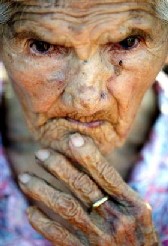|
|
Aging Latinos Face Own Problems
By Nancy Weaver Teichert, The Sacramento Bee
June 1, 2005

California's graying population will bring with it a wave of aging Latinos grappling with chronic health problems worsened by barriers -- especially language -- to medical care, a wide range of health experts say.
Today, about 65 percent of all seniors are non-Latino whites. By 2040, the number of Latino and white seniors will be nearly the same, according to a recently released draft of the new State Plan on Aging.
Older Latinos and all seniors who speak limited English have among the poorest health of all older Californians because of genetic and cultural differences and the lack of preventive care.
Medical research is focusing on the glaring disparities between non-Latino white and Latino seniors.
One new study found that Latinos show symptoms of Alzheimer's disease seven years earlier than non-Latino whites. Other studies show they have strokes at younger ages and their incidence of diabetes is 44 percent higher. Nearly 45 percent of older Latinos rate their health as fair or poor, compared with about 25 percent of non-Latino whites, according to the last California Health Interview Survey.
Language is one of the bigger barriers to effective health care for California's growing diverse senior population. About 20 percent of the state's older residents are immigrants from other countries.
"Providing culturally appropriate outreach and assistance is essential in overcoming disparities in accessing health and social services," cautions the state plan's draft.
The UC Davis Center for Healthy Aging has launched a lecture series taught in Spanish by health professionals with information about Alzheimer's disease, diabetes, heart disease and challenges to caregivers.
From his daily practice, Dr. Gustavo Rosales, one of the lecturers, knows how the inability to speak English affects care. Doctors need to be told of symptoms, family history and diet.
"Fifty percent of the diagnosis is done by the history a patient gives you," said Rosales, of the Rosales Medical Group.
He estimated 80 percent of the clinic's 5,000 patients don't speak English.
Even among Latinos, there are big differences that affect health, he said. For example, what a senior from Panama may eat differs from what a senior from Mexico might, Rosales said.
Amalia Guerra, 77, of Sacramento, has suffered from high blood pressure since age 29.
Latinos face a higher risk of hypertension, and it runs in Guerra's family. She takes her daughter along to translate her concerns to her Chinese American doctor. Despite saying her medical care has been good, she complained that her blood pressure pills still cause her headaches.
In a recent publication, Dr. Satya Chatterjee, president of the Sierra Sacramento Valley Medical Society, raised concerns that using translators to communicate with patients has problems. He urged doctors to learn a second language.
He wrote that the use of family or friends as translators is problematic given their lack of medical expertise and privacy issues.
"Sometimes things get lost in translation," said Maria Lueras, who founded Manitos, a Spanish language program at midtown's Hart Senior Center, which Guerra attends. "Important topics don't get covered."
Lambrinos said state officials know that more has to be done to get seniors of different ethnic and racial groups to go to senior centers, which offer preventive screening services
and education.
|
|



